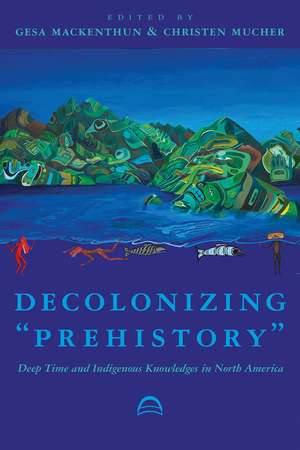Decolonizing “Prehistory”: Deep Time and Indigenous Knowledges in North America: Archaeology of Indigenous-Colonial Interactions in the Americas
Editat de Gesa Mackenthun, Christen Mucheren Limba Engleză Paperback – 30 noi 2021
Constructions of America’s ancient past—or the invention of American “prehistory”—occur in national and international political frameworks, which are characterized by struggles over racial and ethnic identities, access to resources and environmental stewardship, the commodification of culture for touristic purposes, and the exploitation of Indigenous knowledges and histories by industries ranging from education to film and fashion. The past’s ongoing appeal reveals the relevance of these narratives to current-day concerns about individual and collective identities and pursuits of sovereignty and self-determination, as well as to questions of the origin—and destiny—of humanity. Decolonizing “Prehistory” critically examines and challenges the paradoxical role that modern scholarship plays in adding legitimacy to, but also delegitimizing, contemporary colonialist practices.
Contributors: Rick Budhwa, Keith Thor Carlson, Kirsten Matoy Carlson, Jessica Christie, Philip J. Deloria, Melissa Gniadek, Annette Kolodny, Gesa Mackenthun, Christen Mucher, Naxaxalhts’i (aka Sonny McHalsie), Jeff Oliver, Mathieu Picas, Daniel Lord Smail, Coll Thrush
Preț: 330.13 lei
Nou
Puncte Express: 495
Preț estimativ în valută:
63.17€ • 67.55$ • 52.67£
63.17€ • 67.55$ • 52.67£
Carte indisponibilă temporar
Doresc să fiu notificat când acest titlu va fi disponibil:
Se trimite...
Preluare comenzi: 021 569.72.76
Specificații
ISBN-13: 9780816546954
ISBN-10: 0816546959
Pagini: 288
Ilustrații: 31 b&w illustrations, 3 tables
Dimensiuni: 152 x 229 x 20 mm
Greutate: 0.3 kg
Editura: University of Arizona Press
Colecția University of Arizona Press
Seria Archaeology of Indigenous-Colonial Interactions in the Americas
ISBN-10: 0816546959
Pagini: 288
Ilustrații: 31 b&w illustrations, 3 tables
Dimensiuni: 152 x 229 x 20 mm
Greutate: 0.3 kg
Editura: University of Arizona Press
Colecția University of Arizona Press
Seria Archaeology of Indigenous-Colonial Interactions in the Americas
Notă biografică
Gesa Mackenthun teaches American studies at Rostock University and is the author and co-editor of several works, including Metaphors of Dispossession: American Beginnings and the Translation of Empire.
Christen Mucher is an associate professor of American studies at Smith College and the author of Before American History: Archives, Antiquities, and Native Pasts.
Christen Mucher is an associate professor of American studies at Smith College and the author of Before American History: Archives, Antiquities, and Native Pasts.
Recenzii
"This book packs a double revelation and, with it, an important message for the environmental movement."—Heather Menzies, Watershed Sentinel
“Decolonizing “Prehistory” carries readers to the rugged landscapes of the Pacific Northwest to hear how they are known by communities with millennial depth as residents. The book adds breadth with chapters on the Penobscot River People, Maya communities living at tourist destinations Coba and Tulum, and Mammoth Cave. Philip Deloria concludes the book with a reading of his father’s no-holds-barred assertion of flaws in Western science, a position that time has brought closer to anthropologists’ own critiques seen in this volume.”—Alice Beck Kehoe, author of Traveling Prehistoric Seas: Critical Thinking on Ancient Transoceanic Voyages
“Decolonizing “Prehistory” carries readers to the rugged landscapes of the Pacific Northwest to hear how they are known by communities with millennial depth as residents. The book adds breadth with chapters on the Penobscot River People, Maya communities living at tourist destinations Coba and Tulum, and Mammoth Cave. Philip Deloria concludes the book with a reading of his father’s no-holds-barred assertion of flaws in Western science, a position that time has brought closer to anthropologists’ own critiques seen in this volume.”—Alice Beck Kehoe, author of Traveling Prehistoric Seas: Critical Thinking on Ancient Transoceanic Voyages
Descriere
Decolonizing “Prehistory” critically examines and challenges the paradoxical role that modern historical-archaeological scholarship plays in adding legitimacy to, but also delegitimizing, contemporary colonialist practices. Using an interdisciplinary approach, this volume empowers Indigenous voices and offers a nuanced understanding of the American deep past.














